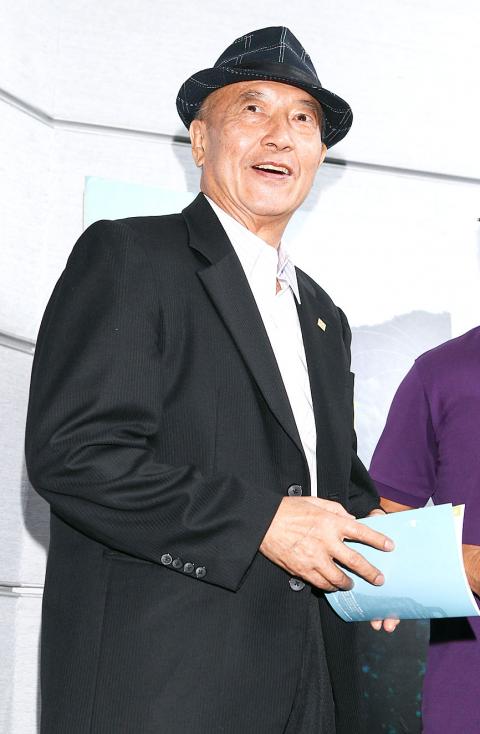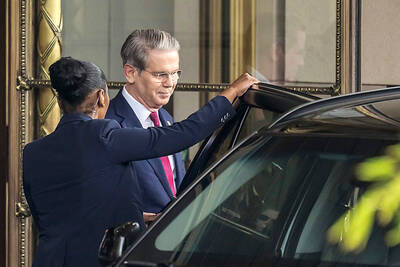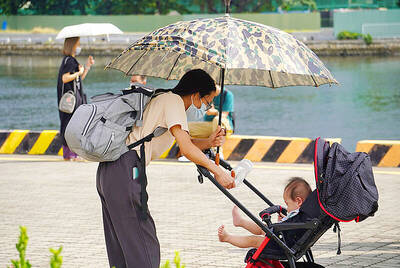The curtains fell one final time for Ko Chun-hsiung (柯俊雄), the star of a series of early films aimed at galvanizing patriotic sentiments, who died of cancer at the age of 70 on Sunday.
Born in Kaohsiung on Jan. 15, 1945, Ko’s acting career spanned half a century, highlighted first by his leading roles in adaptations of best-selling romantic novels and then by his portrayal of military heroes in the Second Sino-Japanese War.
In 1967, he became the first Taiwanese to win the best actor award at the Asia-Pacific Film Festival for his role in Lonely Seventeen (寂寞的十七歲). He won in the same category at the festival seven years later.

Photo: Wang Wen-lin, Taipei Times
Ko also won Taiwan’s Golden Horse Award for best actor in 1979 and 1999 for his roles in A Teacher of Great Soldiers (黃埔軍魂) and Cao Cao (一代梟雄曹操) respectively.
The era in which the films were cast was still strongly influenced by the idea that the Three Principles of the People (三民主義) would triumph and unite China, with Ko starring in films seeking to promote nationalism in the roles of army commanders that were not only patriotic, but also loyal to the Chinese Nationalist Party (KMT).
In 1974, Ko played the role of general Chang Tzu-chung (張自忠) in the film The Everlasting Glory (英烈千秋), which depicted the 1940 Battle of Zaoyang-Yichang during the Second Sino-Japanese War, winning him his second best leading male actor award at the Asia-Pacific Film Festival that year.
Ko went on to win a Golden Horse Award for his portrayal of colonel Hsieh Chin-yuan (謝晉元) in Eight Hundred Heroes (八百壯士) in 1976, as well as receiving the Golden Horse best film award for his role in the 1975 film Victory (梅花).
However, Ko did not receive the Golden Horse Award for best male lead until 1978, when he starred in A Teacher of Great Soldiers.
When the reception to Central Motion Pictures’ patriotic movies waned in the late 1980s, Ko sought other roles and found a niche in the antihero role, winning the best actor award for his portrayal of Eastern Han Dynasty warlord Cao Cao (曹操) in the 1999 film of the same name.
Ko developed an interest in politics in the 1990s and, due to having a British-Hong Kong passport, participated in a 1996 People’s Republic of China-convened provisional legislative council of the Hong Kong Special Administrative Region.
“The Republic of China should have someone to represent its opinion,” Ko said at the event, despite not being elected to the council.
In 2004, Ko was elected to the legislature as a KMT candidate. He ran for a second term in 2008 as a Taiwan Farmers’ Party candidate, but lost the election and exited the political scene.
Ko was married twice. In 1970, he tied the knot with actress Chang Mei-yao (張美瑤), with whom he had two daughters. Their marriage ended in 2004 after Ko had an affair with clothing designer Tsai Ching-hua (蔡青樺), whom he met on the set of a film. Ko and Tsai married in 2005 and had a son and a daughter.
In 2012, after learning of the death of his ex-wife, Ko broke down in tears and apologized for the mistakes he had made during their marriage, saying: “It was all my fault.”
Ko was diagnosed with terminal lung cancer last year and underwent chemotherapy in May, sources said, adding that his condition remained unstable until he passed away on Sunday night.
Additional reporting by CNA

Taiwanese Olympic badminton men’s doubles gold medalist Wang Chi-lin (王齊麟) and his new partner, Chiu Hsiang-chieh (邱相榤), clinched the men’s doubles title at the Yonex Taipei Open yesterday, becoming the second Taiwanese team to win a title in the tournament. Ranked 19th in the world, the Taiwanese duo defeated Kang Min-hyuk and Ki Dong-ju of South Korea 21-18, 21-15 in a pulsating 43-minute final to clinch their first doubles title after teaming up last year. Wang, the men’s doubles gold medalist at the 2020 and 2024 Olympics, partnered with Chiu in August last year after the retirement of his teammate Lee Yang

FALSE DOCUMENTS? Actor William Liao said he was ‘voluntarily cooperating’ with police after a suspect was accused of helping to produce false medical certificates Police yesterday questioned at least six entertainers amid allegations of evasion of compulsory military service, with Lee Chuan (李銓), a member of boy band Choc7 (超克7), and actor Daniel Chen (陳大天) among those summoned. The New Taipei City District Prosecutors’ Office in January launched an investigation into a group that was allegedly helping men dodge compulsory military service using falsified medical documents. Actor Darren Wang (王大陸) has been accused of being one of the group’s clients. As the investigation expanded, investigators at New Taipei City’s Yonghe Precinct said that other entertainers commissioned the group to obtain false documents. The main suspect, a man surnamed

US Secretary of the Treasury Scott Bessent and US Trade Representative Jamieson Greer began talks with high-ranking Chinese officials in Switzerland yesterday aiming to de-escalate a dispute that threatens to cut off trade between the world’s two biggest economies and damage the global economy. The US delegation has begun meetings in Geneva with a Chinese delegation led by Chinese Vice Premier He Lifeng (何立峰), Xinhua News Agency said. Diplomats from both sides also confirmed that the talks have begun, but spoke anonymously and the exact location of the talks was not made public. Prospects for a major breakthrough appear dim, but there is

The number of births in Taiwan fell to an all-time monthly low last month, while the population declined for the 16th consecutive month, Ministry of the Interior data released on Friday showed. The number of newborns totaled 8,684, which is 704 births fewer than in March and the lowest monthly figure on record, the ministry said. That is equivalent to roughly one baby born every five minutes and an annual crude birthrate of 4.52 per 1,000 people, the ministry added. Meanwhile, 17,205 deaths were recorded, resulting in a natural population decrease of 8,521, the data showed. More people are also leaving Taiwan, with net